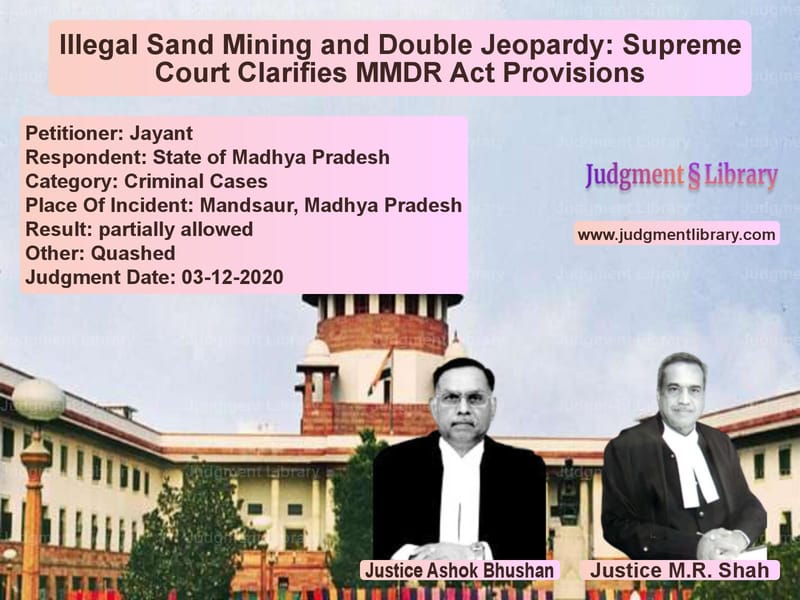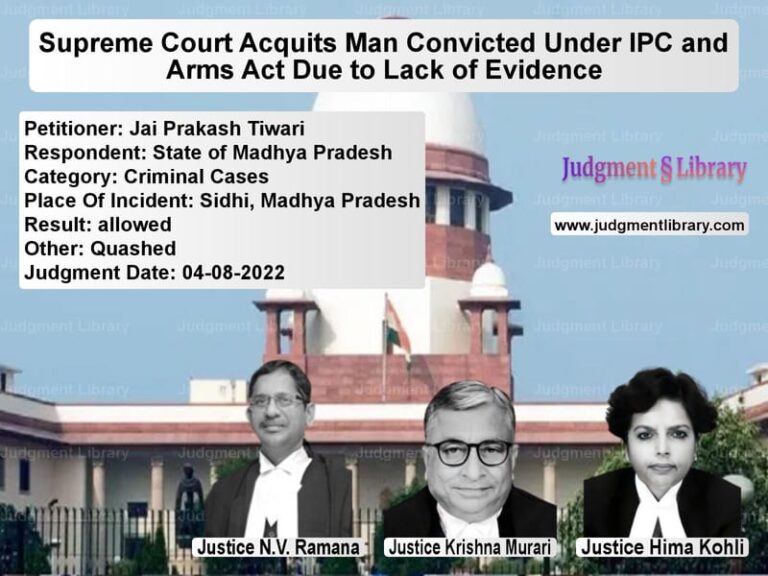Illegal Sand Mining and Double Jeopardy: Supreme Court Clarifies MMDR Act Provisions
The case of Jayant vs. State of Madhya Pradesh revolved around the legal validity of criminal proceedings initiated under the Indian Penal Code (IPC) and the Mines and Minerals (Development and Regulation) Act, 1957 (MMDR Act) for illegal mining. The Supreme Court had to determine whether prosecutions under IPC could proceed independently, even after compounding of offenses under the MMDR Act, and whether such parallel proceedings violated the principle of double jeopardy.
Originally, the High Court of Madhya Pradesh had dismissed applications seeking quashing of FIRs lodged against the appellants for offenses under Sections 379 and 414 of IPC, Sections 4/21 of the MMDR Act, and Rule 18 of the Madhya Pradesh Minerals (Prevention of Illegal Mining, Transportation, and Storage) Rules, 2006. The Supreme Court upheld part of the High Court’s decision, ruling that criminal proceedings under the MMDR Act could not continue once an offense was compounded, but the offenses under IPC could be prosecuted separately.
Background of the Case
- On a surprise inspection, Mining Inspectors in Madhya Pradesh found several tractor-trolleys engaged in illegal sand mining and transportation.
- The vehicles were handed over to the police, and cases were prepared under Rule 53 of the Madhya Pradesh Minor Mineral Rules, 1996.
- The violations were compounded by collecting fines from the accused, and the vehicles were released.
- Later, media reports highlighted rampant illegal mining activities in the region, leading a Magistrate to initiate criminal proceedings under Section 156(3) of CrPC, directing police to register FIRs.
- The appellants challenged the criminal cases, arguing that their offenses had already been compounded under the MMDR Act.
Petitioner’s Argument
The appellants argued:
- Section 22 of the MMDR Act bars prosecution under IPC for illegal mining unless initiated through a complaint by an authorized officer.
- Since the mining offenses had been compounded under Section 23A of the MMDR Act, further prosecution under IPC would amount to double jeopardy.
- The Magistrate’s suo motu direction for police action was beyond legal jurisdiction.
- Proceedings should have been initiated by the Mining Officer, not by the police.
Respondent’s Argument
The State of Madhya Pradesh countered:
- Illegal mining is a serious offense, causing environmental damage and revenue loss.
- The IPC and MMDR Act address different aspects of illegal mining—one deals with theft of natural resources, while the other regulates mining activities.
- The Supreme Court’s decision in State (NCT of Delhi) vs. Sanjay held that MMDR Act does not bar prosecution under IPC for offenses like theft.
- The principle of double jeopardy does not apply because compounding under MMDR Act does not absolve an accused from charges under IPC.
Supreme Court’s Key Observations
The Supreme Court, in its ruling delivered by Justices Ashok Bhushan and M.R. Shah, addressed the following:
1. Applicability of Section 22 of MMDR Act
The Court held that:
- Section 22 bars prosecution under MMDR Act without a written complaint from the competent authority.
- However, this does not extend to offenses under IPC, which deal with separate criminal liability.
- The prohibition under MMDR Act applies only when a Magistrate takes cognizance, not when directing an investigation.
2. Legality of Parallel IPC Prosecution
The Court reaffirmed the principle set in State (NCT of Delhi) vs. Sanjay, stating:
“The ingredients constituting an offense under MMDR Act and the ingredients of theft under IPC are different. Dishonestly removing minerals from government land constitutes theft and can be prosecuted under IPC.”
The Court ruled that:
- Compounding under MMDR Act does not prevent prosecution under IPC.
- The theft of government minerals constitutes an independent offense.
- Registration of FIRs for theft and dishonestly receiving stolen property is legal.
3. Environmental and Public Interest Concerns
The Court took note of the severe damage caused by illegal mining, stating:
“Rivers in India have been affected by unrestricted sand mining, causing ecological imbalance, damaging riverbeds, and depleting groundwater levels.”
It emphasized that stringent actions were necessary to prevent illegal mining and protect natural resources.
Final Judgment
- The Court partially allowed the appeals, quashing prosecutions under the MMDR Act.
- However, criminal proceedings under IPC were allowed to continue.
- The appeal by the State of Madhya Pradesh was dismissed.
- The violators were directed to face trial under Sections 379 and 414 of IPC.
Implications of the Judgment
This ruling has significant implications:
- Illegal mining can be prosecuted separately under IPC and MMDR Act.
- Compounding under MMDR Act does not bar proceedings under IPC.
- Courts must balance environmental concerns with legal provisions.
- Magistrates can order FIR registration under Section 156(3) CrPC without taking cognizance.
- Strict penalties and stringent actions are necessary to curb illegal sand mining.
This judgment reinforces the principle that offenders cannot escape liability merely by paying fines and must face criminal prosecution for theft of natural resources.
Petitioner Name: Jayant.Respondent Name: State of Madhya Pradesh.Judgment By: Justice Ashok Bhushan, Justice M.R. Shah.Place Of Incident: Mandsaur, Madhya Pradesh.Judgment Date: 03-12-2020.
Don’t miss out on the full details! Download the complete judgment in PDF format below and gain valuable insights instantly!
Download Judgment: Jayant vs State of Madhya Prad Supreme Court of India Judgment Dated 03-12-2020.pdf
Direct Downlaod Judgment: Direct downlaod this Judgment
See all petitions in Fraud and Forgery
See all petitions in Theft and Robbery Cases
See all petitions in Environmental Cases
See all petitions in Judgment by Ashok Bhushan
See all petitions in Judgment by Mukeshkumar Rasikbhai Shah
See all petitions in partially allowed
See all petitions in Quashed
See all petitions in supreme court of India judgments December 2020
See all petitions in 2020 judgments
See all posts in Criminal Cases Category
See all allowed petitions in Criminal Cases Category
See all Dismissed petitions in Criminal Cases Category
See all partially allowed petitions in Criminal Cases Category







